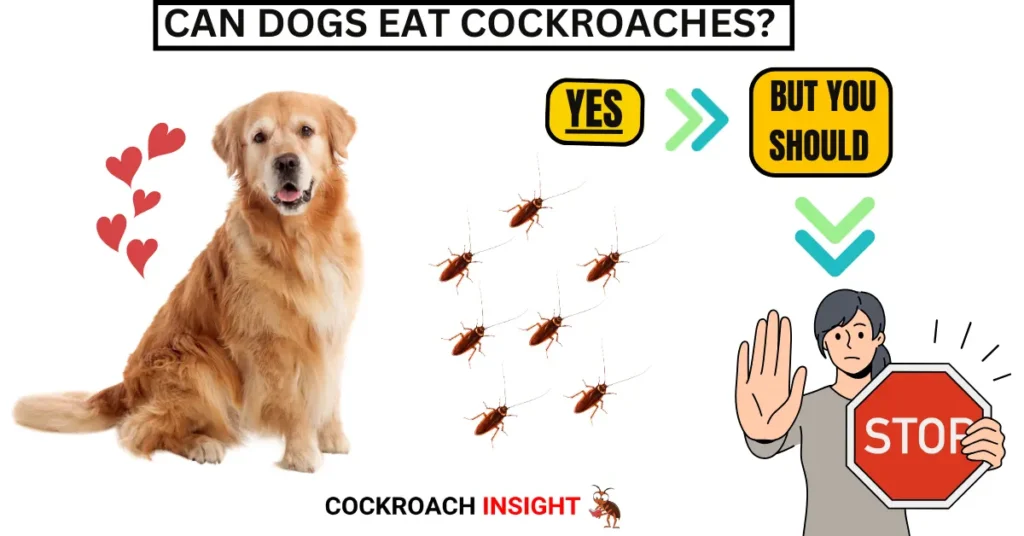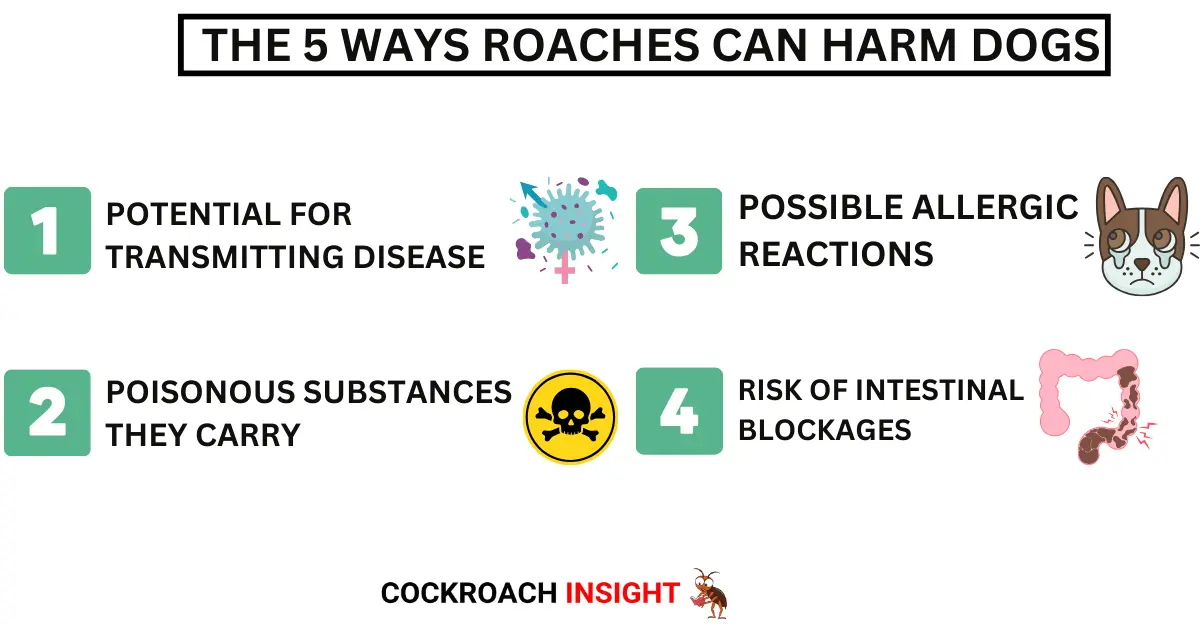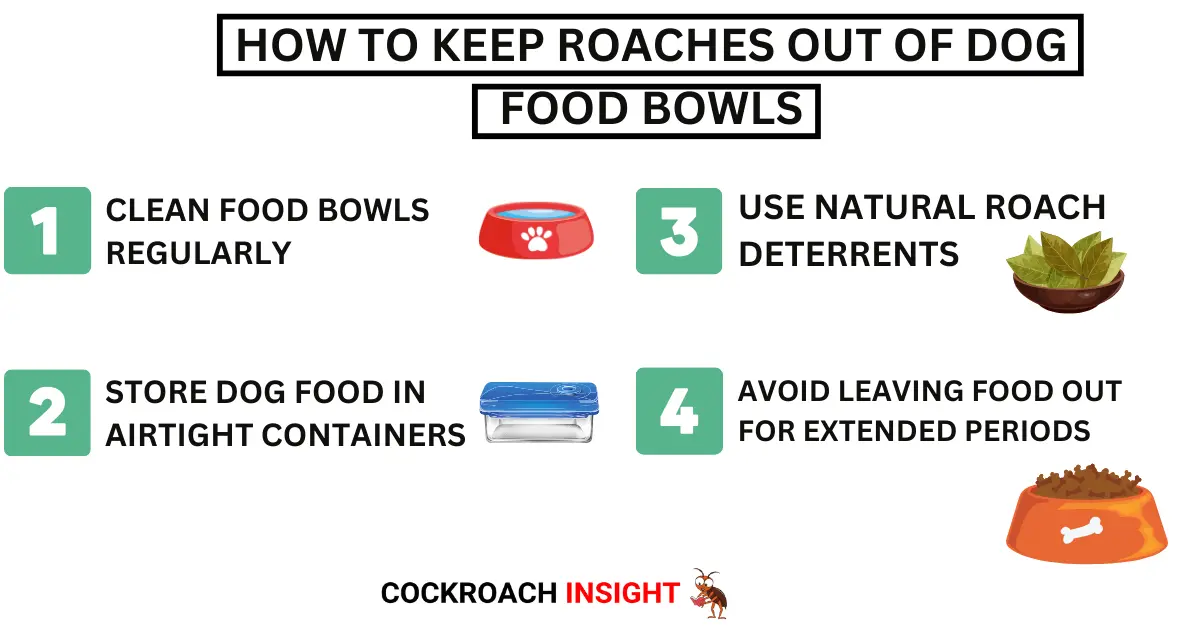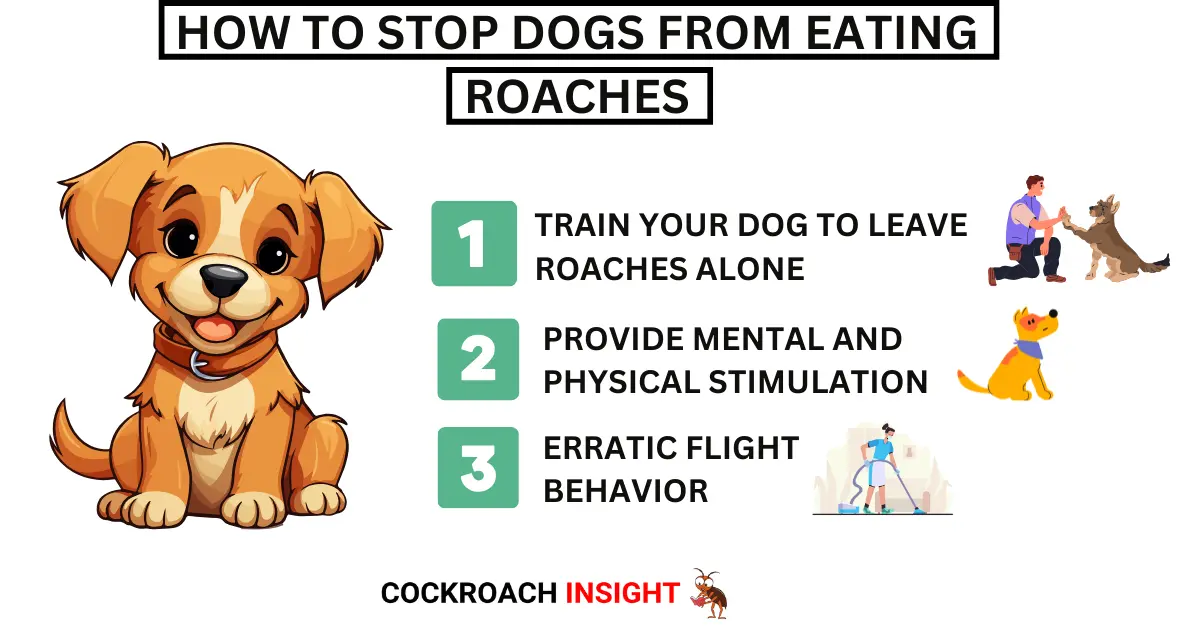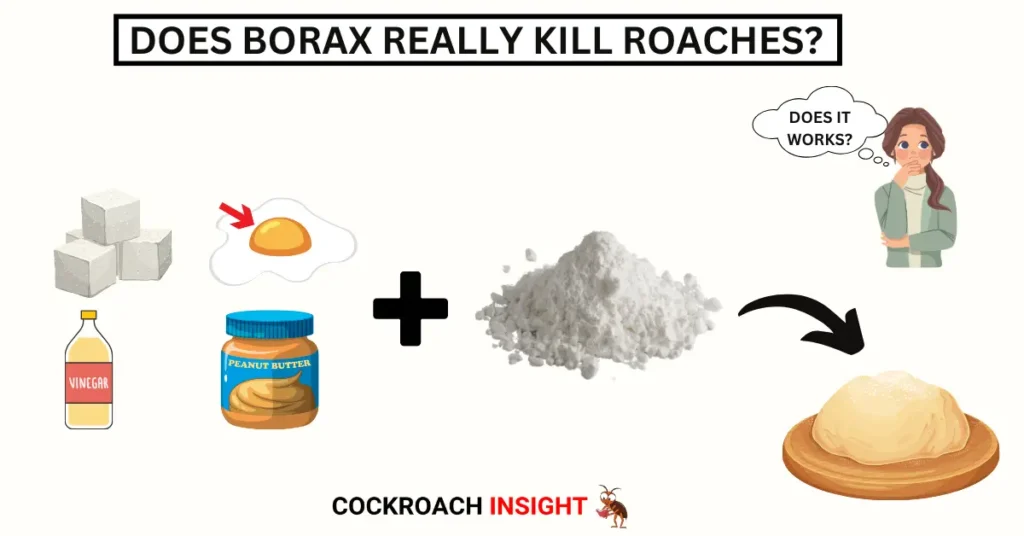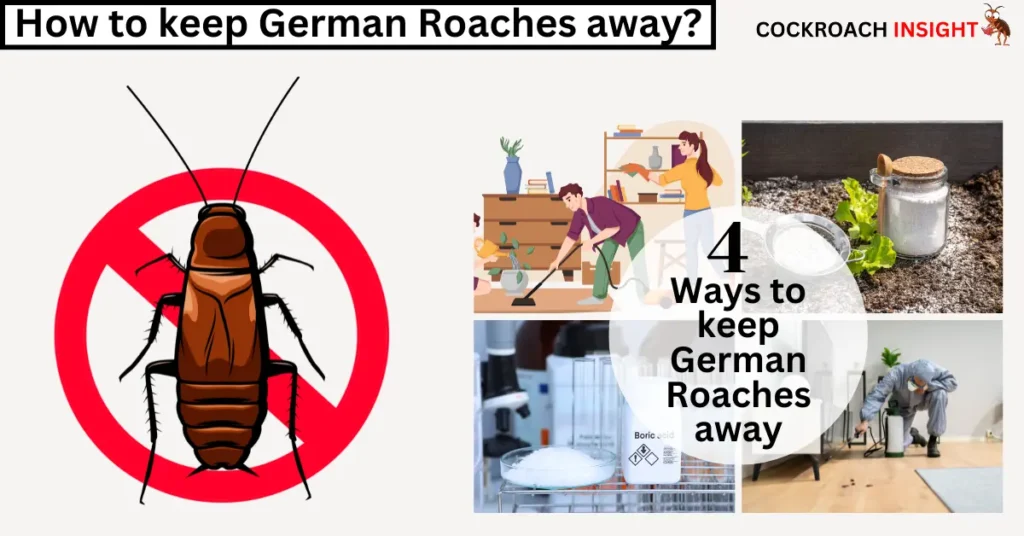Can Dogs Safely Eat Cockroaches? Find Out How!.. Now
Have you ever caught your dog chasing after a cockroach or carrying in its mouth? No one would really think it could be a bad thing, but dog-eating cockroaches can actually be quite dangerous.
These nasty insects are far from safe for our furry friends as they carry diseases and give them digestive troubles. You need to know the dangers and should know beware of what to do if your dog runs into encounter one.
Luckily, you can stay safe with your dog. Simple steps such as cleaning your environment properly, storing food securely, and training your dog not to invade the roaches, can all make all the difference.
That way, if accidents do happen, you know when to consult a vet to keep your pet healthy.
Have you ever been curious as to why dogs eat cockroaches or how to stop them? Read on to learn how you can protect your pup from those pesky bugs!
The 5 Ways Roaches Can Harm Dogs
Potential for Transmitting Disease
Cockroaches are known carriers of harmful bacteria and pathogens, such as Salmonella and E. coli. The microbes in the cockroach can transfer into your dog’s if it eats a cockroach, leading to infections or food poisoning.
This exposure over time can weaken your dog’s immune system and make them vulnerable to illnesses. Dogs can be caught in the early stages of an infection if they have regular vet checkups.
Poisonous Substances They Carry
What roaches do is often crawl through areas that are contaminated with pesticides, chemicals, or other toxic substances. When your dog eats a cockroach, these toxic residues may travel into the body of the animal, causing poisoning.
Poisoning symptoms include drooling, vomiting and fatigue. If you suspect this, it’s imperative for your dog’s safety that you get to a vet immediately.
According to PestWorld, eating cockroaches can expose dogs to harmful diseases and parasites, posing serious health risks.
Possible Allergic Reactions
Cockroaches can be allergenic to dogs, even if they don’t ingest the critters or physically come into contact with them. Respiratory problems can range from itching and swelling.
Repetitive exposure will also make allergic reactions worse. By keeping your home roach-free, you can minimize these risks for your dog.
Risk of Intestinal Blockages
Even though cockroach exoskeletons are not easily digestible, if your dog eats an excess amount, it can get lodged in his digestive tract, causing severe pain or even requiring surgical treatment.
Common symptoms of blockages include nausea, vomiting and lack of appetite, as well as difficulty passing stools. If you believe your dog has eaten something indigestible, you should always monitor your dog.
Potential for Causing Gastrointestinal Issues
Eating cockroaches is not good for your dog’s stomach and can cause symptoms of vomiting, diarrhoea or general digestive upset. If they carry harmful substances or bacteria, this is especially common.
If this behavior isn’t addressed, it can also lead to chronic gastrointestinal issues. However, reducing these risks can be greatly reduced if you ensure your dog has a clean and safe environment.
If you understand these potential dangers, you are better equipped to protect your dog from harm.
Why Does My Dog Eat Cockroaches?
Dogs are naturally curious creatures so their interest in cockroaches might have you curious about why they are fascinated with such pesky bugs. So, let’s dive into some common reasons why this behavior happens.
Natural Hunting Instinct
Dogs have a built-in prey drive, which they inherit from their ancestors. Quick-moving cockroaches can trigger your dog’s hunting instinct and become an irresistible target.
This instinct is especially strong in breeds known for chasing or catching small animals. This is natural behavior, but it can have unintended health consequences.
Curiosity About Moving Objects
Cockroaches are quick and unpredictable movements that are interesting to a dog. Dogs usually investigate things that move uncontrollably, and cockroaches are no different.
Then, they might come chasing, catching, and even eating a cockroach by thinking that it is a fun snack.
Lack of Proper Nutrition
Your dog might eat cockroaches if its diet is not providing the proper nutrients. This phenomenon, called pica, is known to be associated with nutritional deficiencies.
Over time, ensuring your dog has a balanced and vet-approved diet can help curb this behavior.
Boredom or Lack of Mental Stimulation
If dogs aren’t mentally or physically stimulated, they may engage in odd behavior like chasing and eating cockroaches. It’s just a way for them to pass the time when they’re bored.
Ensuring you give the dogs toys to play with that keep their mind engaged, as well as regular exercise and interaction, will help reduce these tendencies.
Underlying Health Issues
Eating cockroaches sometimes indicates an existing problem, such as digestive disorders or nutrient absorption disorders. This, in turn, can encourage dogs to look for unusual ‘food.’
If this behavior is frequent or even concerning, a trip to a veterinarian to rule out medical conditions is a good idea.
The first step to dealing with your dog-eating cockroaches is understanding why they’re doing it in the first place. So next up, let’s talk about what you should do if your dog eats a cockroach!
What Should I Do If My Dog Eats a Cockroach
Fear is normal if you discover your dog eating a cockroach. Ingestion isn’t dangerous in small amounts, but it’s something you should be aware of and know what to do so you don’t hurt your dog’s health. Here’s what you should do
Monitor for Any Signs of Illness
Symptoms to be noticed after your dog eats a cockroach include vomiting, Diarrhoea, drooling, or lethargy. Any of these could be a sign of digestive upset or an allergic reaction to the harmful substances the cockroach is carrying.
Watch their behavior for at least 24-48 hours, and some may not be immediate. You should act quickly if the symptoms are persistent to prevent complications.
Contact a Veterinarian If Necessary
Consult your veterinarian immediately if your dog shows signs of illnessor if you suspect they’ve ingested something toxic (for example, a pesticide-contaminated cockroach).
Detail any unusual symptoms and tell your vet just when your dog ate the cockroach. Early intervention can help prevent a host of more serious health issues.
Ensure Your Dog Is Up-to-Date on Vaccinations
It’s also very important to create vaccinations like rabies and distemper up to date to prevent infections. Cockroaches are rare but can transmit pathogens that could be detrimental to unvaccinated dogs.
Taking your dog to your vet for regular wellness checkups can help you make sure their immunity is strong and that they are protected against potential hazards.
If you can follow these steps, you will care for your dog’s health, and the right action is taken when there are risks. Now let’s look at some realistic methods of keeping roaches out of your dog’s food bowls!
How to Keep Roaches Out of Dog Food Bowls
For this reason, your dog’s bowls can become the target for cockroaches if not taken care of properly. Not only is this helpful for protecting your dog’s food, but it also reduces the risk of your dog accidentally eating cockroaches. Here’s how to keep roaches out of dog food bowls:
Clean Food Bowls Regularly
When you feed your dog, make it a habit to wash down your dog’s food and water bowls. This can attract cockroaches and other pests.
The bowls need to be cleaned with hot water and pet-safe detergent, so there are no traces left behind that could draw in bugs and it also prevent growth of these resilient creatures,
Store Dog Food in Airtight Containers
Open food bags make it easy for cockroaches to invade. Put your dog’s food in airtight containers made of sturdy material like plastic or metal to keep it in good form. Airtight containers not only keep roaches out but also help keep your dog’s food fresh and free of quality.
Avoid Leaving Food Out for Extended Periods
If you leave food in your dog’s bowl for too long, it sets him up for an open invitation for roaches. Serve meals at certain times and take away any uneaten food immediately.
It also adjusts you to keep track of how much your dog eats, ensuring they get the right amount of food to keep up their shape.
Use Natural Roach Deterrents
Put natural repellents like bay leaves or diatomaceous earth in places where you keep dog food. These are non-toxic to pets and even work well to deter roaches. Avoid using chemical pesticides near your dog’s food to ensure their safety.
By implementing these steps, you can protect your dog’s food from unwanted pests and minimize the chances of cockroaches becoming an issue.
Next, let’s discuss how to train and manage your dog to stop them from eating roaches!
How to Stop Dogs from Eating Roaches
You need to train your dog not to eat cockroaches, provide proper care of your dog and environment management.
You can protect your dog from potential harm by addressing the root causes of this behavior. Here’s how to discourage this habit:
Train Your Dog to Leave Roaches Alone
Commands like ‘leave it’ or ‘drop it’ teach your dog to ignore cockroaches when they see them. The reward-based training helps reinforce good behavior and change focus.
The most effective way to train is to begin with less tempting objects, working up to working with real-world scenarios.
Provide Mental and Physical Stimulation
If dogs are bored or under-stimulated, they may be curious and chase cockroaches. Keep your dog busy with regular exercise, interactive toys and mentally stimulating activities.
Redirecting their energy into these healthier things can include puzzle toys, fetch, training sessions, or whatever you like.
Keep Your Home Clean and Free of Roaches
It is important to reduce your dog’s exposure to cockroaches. Keep up vacuuming, sealing cracks, and making sure there is no food put out.
This basically means having a pest-free environment makes it less likely that your dog will come across cockroaches in the first place.
Taking care of these factors allows you to eliminate your dog from eating roaches and as well take care of its safety. Read on in the next section to learn how to make your home less attractive to cockroaches altogether!
Making Your Home Unattractive to Roaches
It’s also very important to create a pest-free environment for both your dog’s safety and your home’s hygiene.
Cockroaches have no problem thriving in places that are cluttered and dirty, but there are some things you can do to prevent cockroaches from taking up residence. Here’s how:
Seal Cracks and also Crevices in Walls and Floors
Cockroaches enter your home through gaps, cracks, or holes. Seal these entry points with caulk or weather stripping around windows, doors and baseboards.
Be aware that areas near plumbing, such as roaches, probably use this as an entry point. It leaves them with nowhere to hide inside a well-sealed home.
Keep Kitchen and Eating Areas Clean
Clean countertops, floors, and cabinets regularly by removing food crumbs and spills around the house that attract roaches. Eliminate odors which can lure them in by wiping surfaces with disinfectant.
Daily take the trash out and seal it in sealed bins to avoid pests having easy meals.
Store Food Properly
All food items, including dog food, should always be put in airtight containers. This stops cockroaches from getting to their primary food source and deters infestation.
Make sure to clean the pantry shelves often and throw away expired food, which may attract pests.
Fix Leaks and Remove Moisture
If faucets and pipes are leaking, cockroaches are drawn to water. Place dehumidifiers where needed (basement, bathroom) to ensure your home is dry.
Cockroaches tend to stay away from your home if they don’t have access to the water.
Use Pet-Safe Roach Deterrents
Instead of strong chemical repellents, many natural repellants like bay leaves, peppermint oil or diatomaceous earth will remain safer around your pets. They are safe and effective methods of controlling pests.
Using these strategies, you can bring together an atmosphere that is actually not appealing for cockroaches but also stays safe for your furry buddies
When to Consult a Vet
Even with the best precautions, your dog could come across or eat a cockroach. It is important to know when to ask for veterinary advice to take good care of your pet.
Here are the scenarios when you should consult a veterinarian:
Persistent Diarrhea, Vomiting or Other Symptoms
If your dog continues to experience digestive upsets such as vomiting, diarrhea or excessive drooling after eating a roach, it could be a sign of a more serious problem.
This can be due to eating harmful bacteria, toxic substances or allergic reactions. It’s possible to get treatment from a vet to deal with the problem.
Visible Bug Residue in Stool or Significant Behavior Changes
If you see remnants of the cockroaches in your dog’s stool or if your dog is behaving strangely, like being lethargic, refusing to eat, or showing discomfort, then check it with your vet right away.
These symptoms could mean internal blockages or reactions that require medical attention.
General Concerns About the Dog’s Health or Diet
Eating cockroaches may be a sign that your dog has pica or a nutritional deficiency. A veterinarian can assess Your dog’s overall health and recommend adjustments to your dog’s diet or behaviour management.
In addition, regular wellness checks can help address underlying health conditions early.
Staying vigilant and getting professional help when required will help your dog stay healthy and safe.
Conclusion
Cockroach encounters with your dog are perfectly normal, but it’s important to be aware of the actual risks these pests pose to your dog in the same room.
Cockroaches can be more of a threat than you’d think, from carrying diseases to triggering allergic reactions or even digestive problems.
The bad news is that bugs want to feed on your dog, but the good news is that with regular cleaning, proper training and taking basic steps like storing food securely or closing entry points, you can limit your dog’s exposure to them.
Preventing unwanted incidents in your dog’s place requires keeping your home and your dog pest-free and giving your dog a healthy and interesting environment.
If your dog experiences any adverse effects after eating a cockroach, remember not to wait to consult a veterinarian.
There has never been a better time to strive to be proactive and informed about your furry friend’s safety and happiness.
FAQ SECTION
Can cockroaches give dogs diseases?
Yes, cockroaches can carry harmful bacteria like Salmonella and E. coli, which can transfer to your dog if ingested. These pathogens can cause infections or digestive issues.
Can dogs get worms from eating cockroaches?
While rare, cockroaches can act as intermediate hosts for parasitic worms like tapeworms. If your dog eats an infected cockroach, they could be at risk of developing worms.
Why is my dog obsessed with cockroaches?
Dogs are naturally curious and may be drawn to the fast, unpredictable movements of cockroaches. Other reasons could include boredom, nutritional deficiencies, or instinctual hunting behavior.
What if my dog ate a cockroach?
Monitor your dog for symptoms like vomiting, diarrhea, or lethargy. If they show persistent symptoms or you suspect the cockroach was exposed to harmful substances, consult your veterinarian.
Can dogs be allergic to cockroaches?
Yes, some dogs can have allergic reactions to cockroaches. Symptoms may include itching, swelling, or respiratory issues. If you suspect an allergy, consult your vet.
How do dogs react to roaches?
Dogs may chase or eat cockroaches out of curiosity or instinct. While most dogs won’t have a severe reaction, some may experience digestive upset, allergic reactions, or illness if the roach carried harmful substances.

